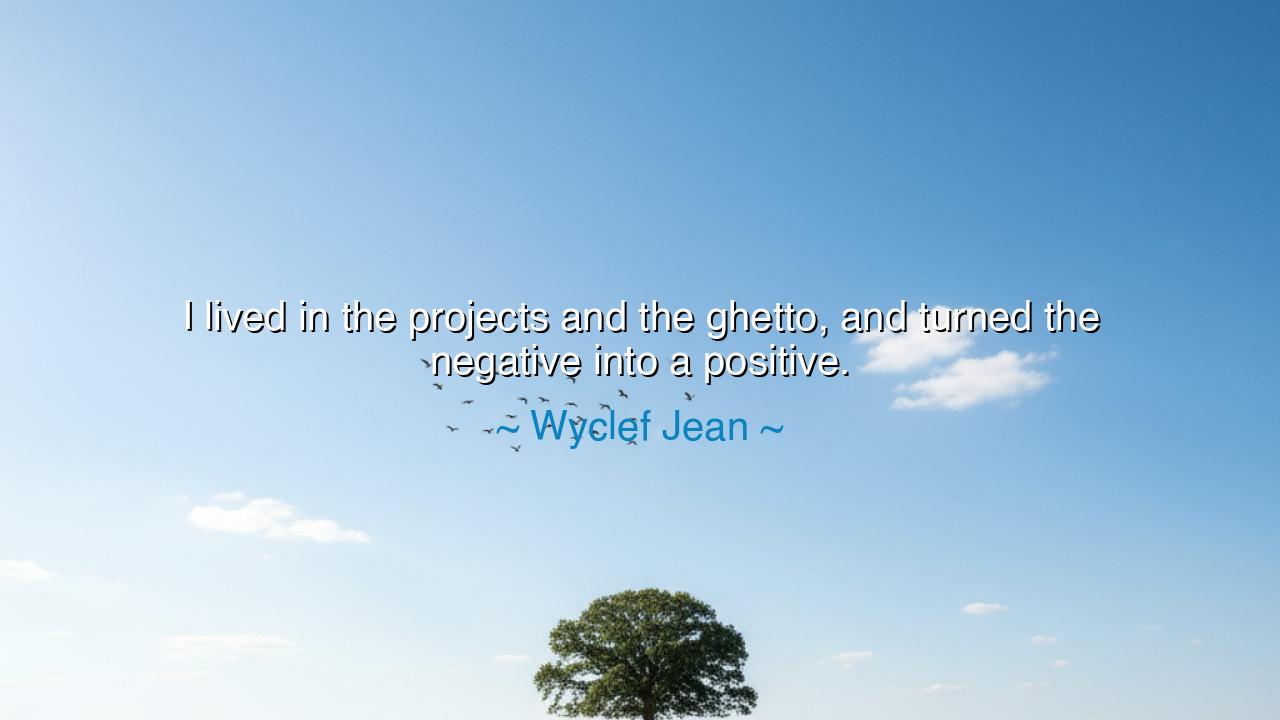
I lived in the projects and the ghetto, and turned the negative






Hear the voice of Wyclef Jean, son of struggle and of song, who declared with the weight of his journey: “I lived in the projects and the ghetto, and turned the negative into a positive.” These words carry the thunder of hardship and the light of transformation. They are not idle boast, but testimony. For they remind us that the place of one’s birth, however harsh, need not chain the destiny of the soul. From the soil of suffering may rise the flower of greatness, if one dares to turn darkness into light.
The meaning of the projects and the ghetto is known to many: places where poverty reigns, where walls are thin, where opportunities are scarce, and where violence and despair often lurk in the shadows. Yet Wyclef speaks not to glorify the pain of these places, but to reveal the alchemy of spirit: that the negative, when met with courage, can be transformed into strength, creativity, and hope. It is the eternal truth that the deepest valleys often give birth to the strongest climbers.
The ancients, too, sang this song of reversal. Did not Epictetus, born a slave, become a philosopher whose words still guide the free? Did not the early Christians, hunted and despised, transform their suffering into a faith that spread across empires? So it is with Wyclef’s words. They are modern echoes of an old truth: that the worth of a man is not in where he begins, but in how he transforms his beginning.
History offers us countless mirrors of this wisdom. Consider the life of Frederick Douglass, born into slavery in the plantations of America. By the measure of his birth, he was meant for chains and silence. But he seized the power of learning, taught himself to read, and turned the negative of bondage into the positive of wisdom and leadership. He rose to speak before kings and presidents, declaring liberty for his people. Like Wyclef, he too turned hardship into greatness, proving that beginnings need not dictate endings.
Wyclef’s words also carry the reminder that transformation is not solitary—it often comes through art, community, and vision. Music became his weapon, his voice carrying the story of the ghetto to the world. Through rhythm and rhyme, he showed that even the cries of suffering could become melodies of hope. This too is part of the teaching: that creativity can transmute despair, that expression can heal wounds and build bridges.
The lesson for us, then, is this: do not despise the place of your trial, for it may be the forge of your strength. The negative circumstances you endure—poverty, rejection, pain—can become the foundation upon which you build a life of power and meaning. But this transformation does not happen by chance; it requires choice, effort, and vision. One must decide to rise, to take what was meant to break you and make it the very thing that lifts you.
Practical wisdom flows from here. When hardship presses upon you, ask not, “Why me?” but, “What can I forge from this fire?” Use your struggles as fuel for creativity, for discipline, for compassion toward others. Seek out mentors, teachers, and allies who can help you rise. And when you succeed, do not forget your beginnings, but let your story inspire others still trapped in the shadows of despair. For your transformation is not only for you, but for all who look upon your light.
Thus the words of Wyclef Jean endure as a hymn of resilience: to turn the negative into a positive is the sacred art of survival and triumph. Let future generations remember that even in the harshest ghettos of life, the human spirit can create beauty, dignity, and greatness. For the soul that refuses to be crushed is the soul that carries fire through the ages.






HAtran van hoang an
This statement makes me think about resilience and perspective. I’d like to ask how Wyclef identifies which negative elements to transform and which to accept or work around. How does he maintain optimism and direction in environments that are constantly challenging? Furthermore, does he see turning negatives into positives as a lifelong process, and how does he continue to apply this philosophy in his career and personal life today?
DNDang Ngo
It’s striking that he frames his environment as a source of both challenge and motivation. I’m curious how Wyclef dealt with setbacks while living in such conditions, and whether music or creative expression was a central tool for transforming negativity. Does he believe that positive transformation is accessible to everyone, or does it require unique personal traits like perseverance, vision, and adaptability?
GDGold D.dragon
This quote highlights the concept of agency in adversity. I wonder if Wyclef sees his ability to turn negatives into positives as a lesson for younger generations. How can storytelling or sharing personal experiences help others in similar situations? Also, does he view his success as primarily a result of internal mindset shifts, or does he credit external opportunities and relationships that helped him navigate and overcome challenges?
HDNguyen Thi Ha Duong
Reading this makes me reflect on the broader social implications of poverty and environment. I’d like to ask Wyclef what role external support, mentorship, or community programs played in his journey. Can individual resilience alone overcome systemic challenges, or is a combination necessary? Additionally, how does he balance acknowledging the hardships of the projects with celebrating the positive transformation he achieved?
KYLe Kim Yen
I find this perspective empowering but also curious about the nuances. How does Wyclef define 'turning negative into positive'? Does it mean personal success, helping others, or changing one’s mindset? I’m also interested in whether he believes everyone in challenging circumstances can achieve similar transformations, or if factors like opportunity, support networks, and luck play a significant role. It’s a reminder of how context and effort interact in shaping outcomes.